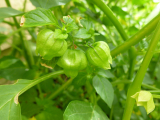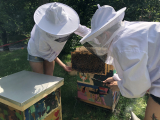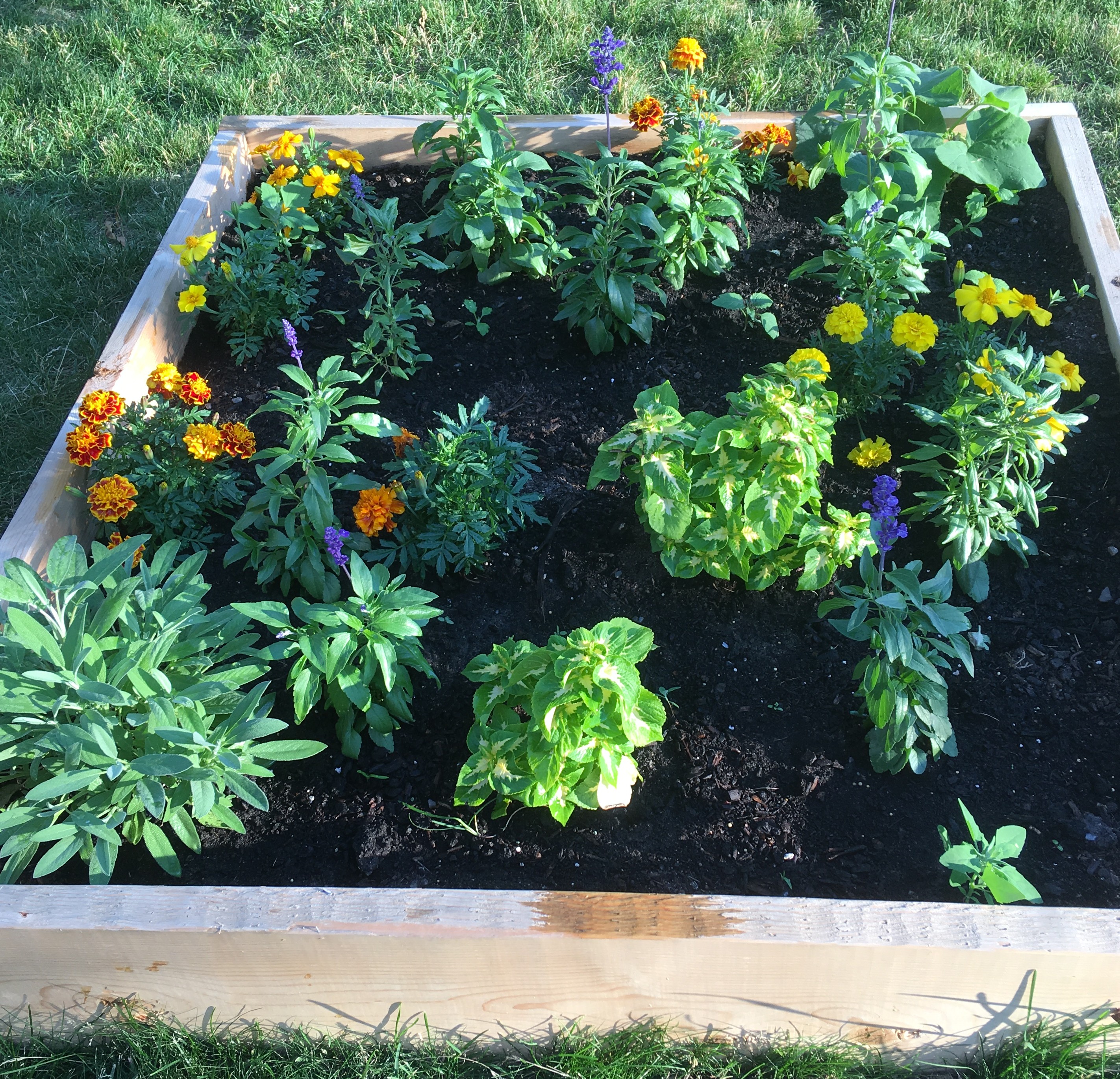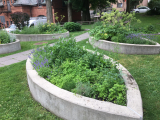In our community garden/outdoor learning space at McGill, in partnership with different schools, and in our community work, we hope to support and facilitate projects that touch on diverse and intersecting educational and social issues. Our ethos is all about supporting the ongoing and excellent work by teachers, community workers, schools and organizations. If you or your organization is interested in collaborating with us, please do get in mitchell.mclarnon [at] mail.mcgill.ca (subject: Collaboration%20) (touch). For a brief overview of some of our past and ongoing projects, please see below.

The Three Sisters Garden, located at the Outdoor Learning Space, is an ongoing initiative led by Dawn Wiseman. In the spring of 2016, the Faculty of Education's Garden Space received a new addition: the Three Sisters Garden. As per Haudenosaunee tradition the Three Sisters - corn, beans, and squash - planted in intercropped mounds.
Dawn Wiseman and Mitchell McLarnon of the Department of Integrated Studies in Education (DISE), worked with Sandra Deer, who is a PhD candidate, teacher and knowledge holder from Kahnawake. Together they reworked a few of the elementary science labs in the EDEE 275 Teaching Science course, so that students could learn about seeds and seedlings, about engaging with Indigenous perspectives in science teaching and learning, and about elements of the Truth and Reconciliation Commission which state that reconciliation cannot be undertaken in the absence of reconciliation with the natural world. In Canadian curricula, science is generally defined as the study of the natural world. For more information and to view a photo album, please click here.
As part of a la rger research project titled: Sampling Youth Development co-directed by Dr. Naomi Nichols and Dr. Jessica Ruglis, Mitchell supported the creation of a garden space at Maison des Jeunes de la Côte-des-Neiges adjacent to the former No Bad Sound hip-hop studio. The construction of the garden at No Bad Sound took place over two days. The first day consisted of conversations lead by the youth participants about to best use the space. The outdoor space available had been unused for many years and as a result had accumulated many discarded items from the studio.
rger research project titled: Sampling Youth Development co-directed by Dr. Naomi Nichols and Dr. Jessica Ruglis, Mitchell supported the creation of a garden space at Maison des Jeunes de la Côte-des-Neiges adjacent to the former No Bad Sound hip-hop studio. The construction of the garden at No Bad Sound took place over two days. The first day consisted of conversations lead by the youth participants about to best use the space. The outdoor space available had been unused for many years and as a result had accumulated many discarded items from the studio.
As a group, we walked around the space and began to imagine what it could look like with a garden. When we sat down to draw the design, we also began to budget for dirt, plants, pots and other gardening supplies. Of the discarded items found in the outdoor space, we opted to recycle objects for gardening whenever possible. For instance, we used an old doorframe as a garden box with great effect. The larger team divided into smaller working groups: some of us went to local gardening stores to purchase the necessary supplies, while other stayed at the studio and began to prepare the area for the previously designed garden. On the second day, most of the plants, materials and supplies were in place, but additional cleaning and finishing touches were needed. For more information on Sampling Youth Development, click here.

In 2017, Alix Petter connected Mitchell with the Benoit Labre House. During the summer of 2017, Jayne and Mitchell supported the upkeep and harvesting of an existing green space, with the help of many participants. Together, we have cultivated different plants to use in meals in the Labre House kitchen, which serves over 76 thousand meals per year to members of the community. Of the plants harvested were tomatoes, tomatillos, zucchinis, eggplants, carrots, cabbages, and beets, along with a variety of herbs like basil, sage, parsley - all of which were dried for use in the kitchen throughout the winter. In 2018, in conversation with employees of the Benoit Labre House, Mitchell redesigned the garden space and has planted several crops that are being harvested weekly in the Labre House kitchen. Specifically, we planted Swiss chard, kale, lettuce, tomatoes, potatoes, zucchinis, and other squash. Mitchell was awarded a Canada Summer Jobs grant and hired six employees to increase collaboration between the Labre House and McGill gardens. Together with Labre House employees, we expanded opportunities for co-learning, employment-related workshops, games, and the building of vermi-composter. We also invited Labre House members to McGill for beekeeping/pollination workshops with Alvéole. Our collective work has a focus on sustainability, healthy eating, food sourcing, and food security.

An important aspect of any garden is its pollinators. Starting in the spring of 2018, McGill's community garden will have a glass observation beehive. Beyond using the hive for pollination and educational purposes, we will be collecting honey in fall to share with our community. In summer of 2019, a new hive was built and numerous bee hotels were placed throughout the garden. For more information, or if you care to come to have a look, please book an appointment with mitchell.mclarnon [at] mail.mcgill.ca (subject: Pollination%20Station) (Mitchell McLarnon).
 Since November 2016, inspiring educator, Christine Vidal and Mitchell have been in conversation about building a garden and starting a garden club at Westmount Park School of the English Montreal School Board. In the spring of 2018, with students of the garden club, Ms. Christine Vidal, Ms. Emilie Newen, Ms. Franzi Kaiser and Mitchell McLarnon built three raised garden beds. The beds are home to a number of flowering plants and vegetables that attract pollinators: a group of insects that are currently at risk due to human activity. The gardens provide an opportunity for students to gain firsthand experience for a real-world purpose, meeting the needs of living organisms, and observing pollination in action.
Since November 2016, inspiring educator, Christine Vidal and Mitchell have been in conversation about building a garden and starting a garden club at Westmount Park School of the English Montreal School Board. In the spring of 2018, with students of the garden club, Ms. Christine Vidal, Ms. Emilie Newen, Ms. Franzi Kaiser and Mitchell McLarnon built three raised garden beds. The beds are home to a number of flowering plants and vegetables that attract pollinators: a group of insects that are currently at risk due to human activity. The gardens provide an opportunity for students to gain firsthand experience for a real-world purpose, meeting the needs of living organisms, and observing pollination in action.
 In 2016, Dr. Noami Nichols opened her network to Mitchell and connected him with Dans La Rue. After many discussions with Dans La Rue, in 2018, Mitchell and Jayne began to help with planting and maintaining the garden at Dans La Rue. While still in the early phases of collaboration, plans are in motion to host youth from Dans La Rue in the faculty of Education Community Garden in the fall of 2018. We also look forward to continuing our work with the Dans La Rue garden in the spring of 2019!
In 2016, Dr. Noami Nichols opened her network to Mitchell and connected him with Dans La Rue. After many discussions with Dans La Rue, in 2018, Mitchell and Jayne began to help with planting and maintaining the garden at Dans La Rue. While still in the early phases of collaboration, plans are in motion to host youth from Dans La Rue in the faculty of Education Community Garden in the fall of 2018. We also look forward to continuing our work with the Dans La Rue garden in the spring of 2019!

Also in 2018, Mitchell and the team have taken on the upkeep to the Roslyn Robertson Herb and Scent garden located on McGill campus. For more information on the Roslyn Robertson Herb and Scent garden, please click here, or contact diana.thiriar [at] yahoo.ca (subject: Roslyn%20Robertson%20Herb%20and%20Scent%20Garden) (Diana Thiriar).
"Originally, when the garden began in the late 1960s, the gardeners were the wives of faculty members. Roslyn Robertson, for instance, was the wife of Rocke Robertson, principal of McGill during the tumultuous '60s. Many of the original members have died or are now too old to garden but the garden has persisted, although in a reduced form."
If you have any questions or care to discuss any of the past or ongoing projects, please contact mitchell.mclarnon [at] mcgill.ca (subject: Garden%20projects) (Mitchell McLarnon).
